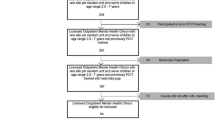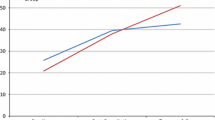Abstract
It is critical that evidence-based practices (EBP’s) be provided to patients. Efforts to train clinicians in the community in EBP’s, however, has been hindered by a lack of resources and rigid and resource intensive models of training. We describe efforts to overcome these barriers in a large scale community-based training program for Interpersonal Psychotherapy implemented with over 1400 clinicians in Los Angeles working within the Los Angeles County Department of Mental Health public system of care. The program, described in detail, is a potential template for training for community-based clinicians in evidence-based psychotherapy practices.
Similar content being viewed by others
References
Aarons, G. A., Fettes, D. L., Flores, L. E., & Sommerfeld, D. H. (2009). Evidence-based practice implementation and staff emotional exhaustion in children’s services. Behavior Research and Therapy, 47, 954–960.
Aarons, G. A., Sommerfeld, D. H., Hecht, D. B., Silovsky, J. F., & Chaffin, M. J. (2009). The impact of evidence-based practice implementation and fidelity monitoring on staff turnover: Evidence for a protective effect. Journal of Consulting and Clinical Psychology, 77(2), 270–280.
Agras, W. S., Walsh, T., Fairburn, C. G., Wilson, G. T., & Kraemer, H. C. (2000). A multicenter comparison of cognitive-behavioral therapy and interpersonal psychotherapy for bulimia nervosa. Archives of General Psychiatry, 57, 459–466.
Beidas, R. S., & Kendall, P. C. (2010). Training therapists in evidence-based practice: A critical review of studies from a systems-contextual perspective. Clinical Psychology, 17, 1–30.
Bleiberg, K., & Markowitz, J. (2005). A pilot study of interpersonal psychotherapy for posttraumatic stress disorder. American Journal of Psychiatry, 162, 181–183.
Bonwell, C. C., & Eison, J. A. (1991). Active learning: Creating excitement in the classroom. In O. o. E. R. a. Improvement (Ed.), (pp. 1–121). Washington, DC: Association for the Study of Higher Education.
Clark, D. M. (2011). Implementing NICE guidelines for the psychological treatment of depression and anxiety disorders: The IAPT experience. International Review of Psychiatry, 23, 318–327.
Clark, D. M. (2013). Developing and disseminating effective psychological treatments: Science, practice, and economics. Canadian Psychology, 54(1), 12–21.
Clark, D. M., Layard, R., Smithies, R., Richards, D. A., Suckling, R., & Wright, B. (2009). Improving access to psychological therapy: Initial evaluation of two UK demonstration sites. Behavior Research and Therapy, 47, 910–920.
Cook, J. M., Dinnen, S., Thompson, R., Simiola, V., & Schnurr, P. P. (2014). Changes in implementation of two evidence-based psychotherapies for PTSD in VA residential treatment programs: A national investigation. Journal of Traumatic Stress, 27(2), 137–143.
Cross, W., Matthieu, M. M., Cerel, J., & Knox, K. L. (2007). Proximate outcomes of gatekeeper training for suicide prevention in the workplace. Suicide and Life Threatening Behavior, 37(6), 659–670.
Cuijpers, P., Geraedts, A. S., van Oppen, P., Andersson, G., Markowitz, J. C., & van Straten, A. (2011). Interpersonal psychotherapy for depression: A meta-analysis. American Journal of Psychiatry, 168(6), 581–592.
Cuijpers, P., van Straten, A., Andersson, G., & van Oppen, P. (2008). Psychotherapy for depression in adults: A meta-analysis of comparative outcome studies. Journal of Consulting and Clinical Psychology, 76(6), 909–922.
Davis, D., O’Brien, M. A., Freemantle, N., Wolf, F. M., Mazmanian, P., & Taylor-Vaisey, A. (1999). Impact of formal continuing medical education: Do conferences, workshops, rounds, and other traditional continuing education activities change physician behavior or health care outcomes? JAMA, 282(9), 867–874.
Dimeff, L. A., Koerner, K., Woodcock, E. A., Beadnell, B., Brownd, M. Z., Skutch, J. M.,…Harned, M. S. (2009). Which training method works best? A randomized controlled trial comparing three methods of training clinicians in dialectical behavior therapy skills. Behavior Research and Therapy, 47, 921–930.
Elkin, I., Shea, M. T., Watkins, J. T., Imber, S. D., Sotsky, S. M., Collins, F. L.,…Parloff, M. B. (1989). NIMH treatment of depression collaborative research program: I. General effectiveness of treatments. Archives of General Psychiatry, 46, 971–982.
Fairburn, C. G., Jones, R., & Peveler, R. C. (1991). Three psychological treatments for bulimia nervosa: A comparative trial. Archives of General Psychiatry, 48, 463–469.
Fairburn, C. G., & Patel, V. (2014). The global dissemination of psychological treatments: A road map for research and practice. American Journal of Psychiatry, 171(5), 495–498.
Firth, N., Barkham, M., Kellett, S., & Saxon, D. (2015). Therapist effects and moderators of effectiveness and efficiency in psychological wellbeing practitioners: A multilevel modelling analysis. Behavior Research and Therapy, 69, 54–62.
Foa, E. B., Keane, T. M., & Friedman, M. J. (2008). Effective treatments for PTSD. Practice guidelines from the international society for traumatic stress studies (2nd ed.). New York: Guilford Press.
Gallon, S. L., Gabriel, R. M., & Knudsen, J. R. W. (2003). The toughest job you’ll ever love: A Pacific northwest treatment workforce survey. Journal of Substance Abuse Treatment, 24(3), 183–196.
Gyani, A., Shafran, R., Layard, R., & Clark, D. M. (2013). Enhancing recovery rates: Lessons from year one of IAPT. Behavior Research and Therapy, 51, 597–606.
Herschell, A. D., Kolko, D. J., Baumann, B. L., & Davis, A. C. (2010). The role of therapist training in the implementation of psychosocial treatments: A review and critique with recommendations. Clinical Psychology Review, 30, 448–466.
Jensen-Doss, A., Hawley, K. M., Lopez, M., & Osterberg, L. D. (2009). Using evidence-based treatments: The experiences of youth providers working under a mandate. Professional Psychology: Research and Practice, 40, 417–424.
King, M., Davidson, O., Taylor, F., Haines, A., Sharp, D., & Turner, R. (2002). Effectiveness of teaching general practitioners skills in brief cognitive behaviour therapy to treat patients with depression: Randomised controlled trial. British Medical Journal, 324, 1–6.
Krupnick, J., Green, B., Stockton, P., Miranda, J., Krause, E., & Mete, M. (2008). Group interpersonal psychotherapy for low-income women with posttraumatic stress disorder. Psychotherapy Research, 18, 497–507.
Lipsitz, J. D., Gur, M., Vermes, D., Petkova, E., Cheng, J., Miller, N., & Fyer, A. J. (2008). A randomized trial of interpersonal therapy versus supportive therapy for social anxiety disorder. Depression and Anxiety, 25, 542–553.
Lopez, M. A., Osterberg, L. D., Jensen-Doss, A., & Rae, W. A. (2011). Effects of workshop training for providers under mandated use of an evidence-based practice. Administration and Policy in Mental Health, 38, 301–312.
Martino, S., Ball, S. A., Nich, C., Canning-Ball, M., Rounsaville, B. J., & Carroll, K. M. (2010). Teaching community program clinicians motivational interviewing using expert and train-the-trainer strategies. Addiction, 106, 428–441.
Matthieu, M. M., Cross, W., Batres, A. R., Flora, C. M., & Knox, K. L. (2008). Evaluation of gatekeeper training for suicide prevention in veterans. Archives of Suicide Research, 12(2), 148–154.
McAlpine, R., Hillin, A., & Stuart, S. (in press). Interpersonal psychotherapy for adolescents and young adults: A clinician’s guide. London: Taylor and Francis.
McHugh, R. K., Murray, H. W., & Barlow, D. H. (2009). Balancing fidelity and adaptation in the dissemination of empirically supported treatments: The promise of transdiagnostic interventions. Behaviour Research and Therapy, 47, 946–953.
Miller, W. R., Sorensen, J. L., Selzer, J. A., & Brigham, G. S. (2006). Disseminating evidence-based practices in substance abuse treatment: A review with suggestions. Journal of Substance Abuse Treatment, 31, 25–39.
Miller, W. R., Yahne, C. E., Moyers, T. B., Martinez, J., & Pirritano, M. (2004). A randomized trial of methods to help clinicians learn Motivational Interviewing. Journal of Consulting and Clinical Psychology, 72(6), 1050–1062.
National Health Service. (2016). IAPT education, training, and development. Retrieved July 6, 2016, from http://www.iapt.nhs.uk/workforce/iapt-education-training-and-development/.
Prince, M. (2004). Does active learning work? A review of the research. Journal of Engineering Education, 93(3), 223–231.
Ray, M. L., Wilson, M. M., Wandersman, A., Meyers, D. C., & Katz, J. (2012). Using a training-of-trainers approach and proactive technical assistance to bring evidence-based programs to scale: An operationalization of the interactive systems framework’s support system. American Journal of Community Psychology, 50, 415–427.
Reay, R., Stuart, S., & Owen, C. (2003). Implementation and effectiveness of Interpersonal Psychotherapy in a community mental health service. Australasian Psychiatry, 11, 284–289.
Resick, P. A., Monson, C. M., & Chard, K. M. (2014). Cognitive processing therapy: Veteran/military version: Therapist and patient materials manual. Washington, DC: Department of Veterans Affairs.
Robertson, M. D., Rushton, P., Batrim, D., & Ray, R. (2004). Group interpersonal psychotherapy for post traumatic stress disorder: Clinical and theoretical aspects. International Journal of Group Psychotherapy, 54, 145–175.
Rollins, A. L., Salyers, M. P., Tsai, J., & Lydick, J. M. (2010). Staff turnover in statewide implementation of ACT: Relationship with ACT fidelity and other team characteristics. Administration and Policy in Mental Health, 37(5), 417–426.
Rounsaville, B. J., Chevron, E. S., Weissman, M. M., Prusoff, B. A., & Frank, E. (1986). Training therapists to perform interpersonal psychotherapy in clinical trials. Comprehensive Psychiatry, 27, 364–371.
Rounsavillle, B. J., O’Malley, S. S., Foley, S., & Weissman, M. M. (1988). Role of manual-guided training in the conduct and efficacy of interpersonal psychotherapy for depression. Journal of Consulting and Clinical Psychology, 56, 681–688.
Schultz, J., & Stuart, S. (2014). Interpersonal Psychotherapy: A culturally adaptive treatment. Psychotherapy in Australia, 21(1), 12–20.
Sholomskas, D., Syracuse-Siewert, G., Rounsaville, B., Ball, S., Nuro, K., & Carroll, K. (2005). We don’t train in vain: A dissemination trial of three strategies of training clinicians in Cognitive-Behavioral Therapy. Journal of Counseling and Clinical Psychology, 73(1), 106–115.
Stangier, U., Schramm, E., Heidenreich, T., Berger, M., & Clark, D. (2011). Cognitive therapy versus interpersonal psychotherapy in social anxiety disorder—A randomized controlled trial. Archives of General Psychiatry, 68, 692–700.
Stewart, M. O., Raffa, S. D., Steele, J. L., Miller, S. A., Clougherty, K. F., Hinrichsen, G. A., & Karlin, B. E. (2014). National dissemination of interpersonal psychotherapy for depression in veterans: Therapist and patient-level outcomes. Journal of Consulting and Clinical Psychology, 82(6), 1201–1206.
Stuart, S. (2015). IPT Quality and Adherence Scale. Retrieved July 6, 2016, from https://iptinstitute.com/ipt-training-materials/ipt-quality-adherence-scale/.
Stuart, S. (2016). Interpersonal psychotherapy in historical perspective. In A. Consoli & L. Beutler (Eds.), Comprehensive textbook of psychotherapy: Theory and practice (2nd ed.). London: Oxford Press.
Stuart, S. (in press). Interpersonal psychotherapy: A clinician’s guide (3rd ed.). London: Taylor and Francis.
Stuart, S., & Robertson, M. (2012). Interpersonal psychotherapy: A clinician’s guide (2nd ed.). London: Taylor and Francis.
Walters, S. T., Matson, S. A., Baer, J. S., & Ziedonis, D. M. (2009). Effectiveness of workshop training for psychosocial addiction treatments: A systematic review. Journal of Substance Abuse Treatment, 29, 283–293.
Weissman, M. M., Verdeli, H., Gameroff, M. J., Bledsoe, S. E., Betts, K., Mufson, L., Fitterling, H., & Wickramaratne, P. (2006). National survey of psychotherapy training in psychiatry, psychology, and social work. Archives of General Psychiatry, 63, 925–934.
Weisz, J. R., Ugueto, A. M., Cheron, D. M., & Herren, J. (2013). Evidence-based youth psychotherapy in the mental health ecosystem. Journal of Clinical Child and Adolescent Psychology, 42(2), 274–286.
Author information
Authors and Affiliations
Corresponding author
Rights and permissions
About this article
Cite this article
Stuart, S., Schultz, J. & Ashen, C. A New Community-Based Model for Training in Evidence-Based Psychotherapy Practice. Community Ment Health J 54, 912–920 (2018). https://doi.org/10.1007/s10597-017-0220-x
Received:
Accepted:
Published:
Issue Date:
DOI: https://doi.org/10.1007/s10597-017-0220-x




